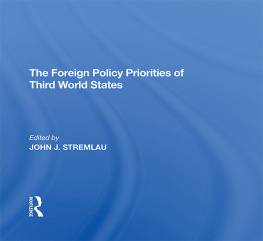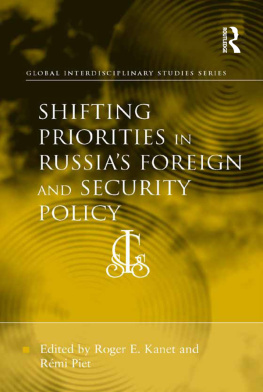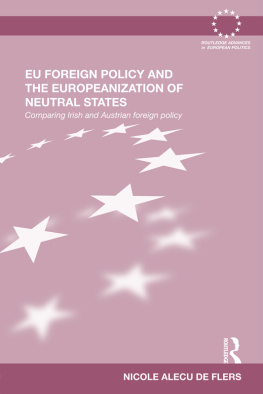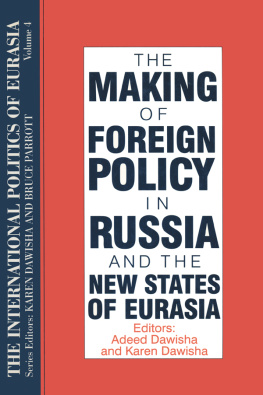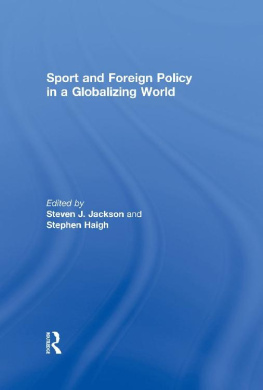The Foreign Policy Priorities of Third World States
Also of Interest
Change in the International System, edited by Ole R. Holsti, Randolph M. Siverson, and Alexander L. George
From Dependency to Development: Strategies to Overcome Underdevelopment and Inequality, edited by Heraldo Muoz
The Third World and U.S. Foreign Policy: Cooperation and Conflict in the 1980s, Robert L. Rothstein
The Theory and Structures of International Political Economy, edited by Todd Sandler
Transnational Enterprises: Their Impact on Third World Societies and Cultures , edited by Krishna Kumar
The Foreign Investment Screening Process in LDCs: The Case of Colombia, 1967-1975, Francois J. Lombard
Debt and the Less Developed Countries, edited by Jonathan David Aronson
The New Economics of Less Developed Countries: Changing Perceptions in the North-South Dialogue, edited by Nake Kamrany
Technological Progress in Latin America: The Prospects for Overcoming Dependency, edited by James H. Street and Dilmus D. James
The Military and Security in the Third World: Domestic and International Impacts, edited by Sheldon W. Simon
African International Relations: An Annotated Bibliography, Mark W. DeLancey
Africa's International Relations: The Diplomacy of Dependency and Change, Ali M. Mazrui
U.S. Foreign Policy and the New International Economic Order, Robert K. Olson
Available in hardcover and paperback
Westview Special Studies in International Relations
The Foreign Policy Priorities of Third World States
edited by John J. Stremlau
Despite the growing economic interdependence that binds industrialized and developing countries-as well as the risk that regional conflict in the Third World could escalate into a major confrontation between the United States and the USSR-relatively little has been published on how governments in Asia, Latin America, and Africa pursue their international interests. This collection, especially intended for university courses in international relations, is designed to fill that gap by highlighting the changing foreign policy priorities of the diverse group of 120 developing nations.
The authors identify and analyze key factors in recent trends in the international relations of Third World countries. Each chapter is problem oriented and reflects an appreciation that Third World governments face real, if very limited, choices as they seek to enhance simultaneously their national security and their economic well-being.
John J. Stremlau is associate director of international relations at the Rockefeller Foundation and an adjunct professor of political science at Columbia University. One of his recent publications is The International Politics of the Nigerian Civil War.
First published 1980, 1982 by Westview Press
Published 2019 by Routledge
52 Vanderbilt Avenue, New York, NY 10017
2 Park Square, Milton Park, Abingdon, Oxon OX14 4RN
Routledge is an imprint of the Taylor & Francis Group, an informa business
Copyright 1980, 1982 by Trustees of Columbia University in the City of New York
All rights reserved. No part of this book may be reprinted or reproduced or utilised in any form or by any electronic, mechanical, or other means, now known or hereafter invented, including photocopying and recording, or in any information storage or retrieval system, without permission in writing from the publishers.
Notice:
Product or corporate names may be trademarks or registered trademarks, and are used only for identification and explanation without intent to infringe.
Library of Congress Cataloging in Publication Data
Main entry under title:
The Foreign policy priorities of Third World states.
(Westview special studies in international relations)
"Initially published in 1980 as a special issue of Columbia's Journal of international affairs"Pref.
Includes index.
1. Underdeveloped areasForeign economic relationsAddresses, essays, lectures. 2. Underdeveloped areasForeign relationsAddresses, essays, lectures. I. Stremlau, John J. II. Title.
HF1413.F67 327.1'11'091724 81-22004
AACR2
ISBN 13: 978-0-367-29223-2 (hbk)
This volume originated in a graduate seminar on the foreign policies of developing countries at Columbia University's School of International Affairs. The seminar encourages students to seek a better understanding of how governments in the Third World have adapted to the unprecedented international diffusion of political and economic power that affects their self-determination and national welfare in new and complex ways. The enthusiastic response to this collection, when it was initially published in 1980 as a special issue of Columbia's journal of International Affairs, suggests that it could serve to fill a gap in international relations curricula as well as being of use as a general reference for scholars engaged in more advanced research on contemporary foreign policies of developing countries.
Few international relations instructors have the time or background to adequately introduce students to the difficult foreign policy choices that confront the diverse range of 120 countries that compose the Third World. Despite the many dramatic examples of economic interdependence that bind industrialized and developing countriesas well as the risk that regional conflict in the Third World could escalate to a major confrontation between the United States and the Soviet Unionrelatively little has been published on how governments in Asia, Latin America, and Africa develop and pursue their foreign policy strategies. The contributors do not analyze the foreign policy priorities of particular governments; rather they attempt to provide the reader with an appreciation of recent trends in the international behavior of Third World countries.
Each chapter is problem oriented and encompasses both security and economic issues. The first four chapters fall in the domain of political science; the rest cover topics usually dealt with by economists. Such disciplinary distinctions, however, have little relevance for analyses of contemporary international relations. The selection of topics reflects our collective desire to question whether the "North-South" issues that feature so prominently in debates and in Western journals and newspapers are, in fact, of vital concern to policymakers in developing countries.
Although we tried to accurately reflect the perceptions of elites in developing countries, it should be noted that most of us are not nationals of these countries; our views are doubtlessly influenced by our Western education and by our particular experiences in the handful of nations in which we have had the privilege to be temporary residents. We hope future case studies that analyze the foreign policy priorities in important Third World capitals will test the assumptions that shaped the scope and content of this book.


